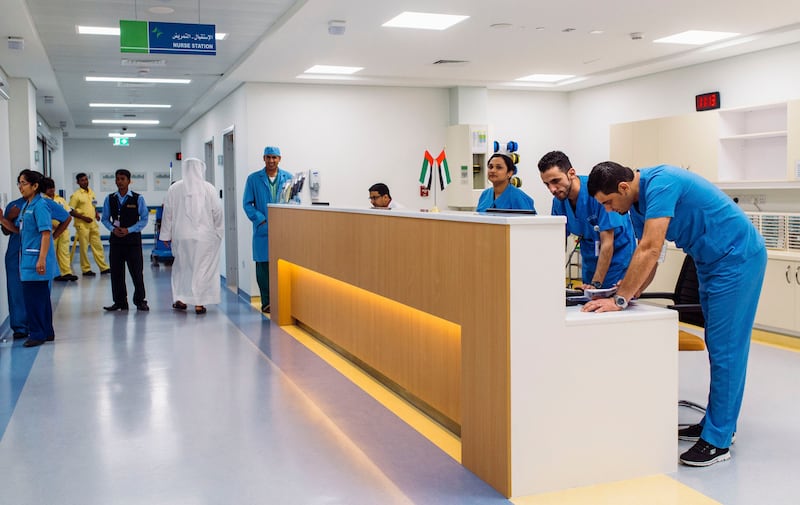DUBAI // The workforce of Dubai's hospitals is typical of many workplaces in the country; a broad range of nationalities, different faiths and a multitude of languages spoken.
Now the secret to that diversity - and the strengths and challenges that it brings - is set out in a study by researchers.
Focused on healthcare, the work used data about the proportion of medical personnel within hospital teams in Dubai that were Muslim or non-Muslim, and Emirati or non-Emirati.
Their conclusion? Diversity is unquestionable good, but at high levels it can introduce challenges that need to be managed.
To understand how these potential influences played out, surveys were completed by 66 hospital wards, 49 of them medical wards and the other 17 surgical wards, at Dubai Hospital, Latifa Hospital and Rashid Hospital, home to one of the largest trauma wards.
One of the researchers, Dr Carmela Di Mauro, an associate professor in business engineering at the University of Catania in Italy, said that a "moderate degree" of diversity was found to be good, but that the data indicated that "things become more difficult" as it continues to increase up to the maximum diversity of 50 per cent of one group and fully 50 per cent of another.
"The reason why intuitively this high degree of diversity doesn't work, is because these two groups might become confrontational if two of equal size sub-groups form within the team… It's not beneficial to performance or decision-making," said Dr Di Mauro.
That said, Dr Di Mauro explained that it is equally beneficial to have a team made up of one group, say group A, constituting 25 per cent, with the other group B constituting fully 75 per cent, and vice versa. "In both cases, the addition of new cultural values, mindsets and points of view contributes to more effective decision-making."
As the study's authors said in a briefing document, a person's religion or nationality can affect their attitudes to work-related issues such as the role of the genders, it can influence how they behave or what they wear, especially in relation to religious festivals, and it can underpin important values, such as the extent to which they have a work ethic. In medicine it may also correlate with differences in training and clinical practice.
To understand how these potential influences played out, surveys were completed by 66 hospital wards, 49 of them medical wards and the other 17 surgical wards, at Dubai Hospital, Latifa Hospital and Rashid Hospital. The aim was to discover the relationship between religious/cultural diversity and efficiency.
A ward's efficiency was calculated using three inputs (the numbers of beds, doctors and nurses) and three outputs (the numbers of inpatient surgery discharges, inpatient non-surgery discharges and outpatients). From these a mathematical model produced a numeric value for efficiency.
Also from the surveys, a numeric value for religious diversity and for diversity in nationality was computed, before a regression analysis - a statistical method for determining the relationship between two variables - was carried out.
The relationship between the hospital teams' religious diversity and their efficiency, when plotted on a graph, produced an inverted U-shape. This means that team efficiency was relatively low when diversity was low, but it grew as diversity increased, peaking at a medium level of religious diversity, before falling as diversity continued to rise.
This finding ties in, Dr Di Mauro says, with work carried out in other employment sectors.
The effect tended to be stronger for surgical than for non-surgical teams, probably because the surgical teams carry out more complex tasks.
"The recommendation we give in the article [is] if you can avoid having that kind of diversity … of creating two sub-groups who may become confrontational inside the team, avoid it. It's a recommendation for hospital managers or [medical] speciality managers," she said.
"Sometimes it cannot be avoided. In that case the way is conflict management; you have to be a very good conflict manager to mitigate the negative effects of that."
Entitled Does Religious Diversity in Health Team Composition Affect Efficiency? Evidence from Dubai, the study was published in the British Journal of Management. Another of the authors was Dr Ali Ayach, a research fellow at University of Rome Tor Vergata in Italy who until 2014 worked for Dubai Health Authority as a consulting manager. The other authors were Dr Alessandro Ancarani, Dr Simone Gitto and Dr Paolo Mancuso, all affiliated to the University of Catania or the University of Rome Tor Vergata.
Dr Ayach, who has since left DHA and now works in the private sector, said the message from the research was that healthcare managers should not look just to technology to improve efficiency, but should adopt a "people-centred" approach.
"Furthermore, a proper standardisation of the medical practice is crucial in this case; such a standardisation may be reached through the introduction of new policies," he said.
Although the research found challenges associated with high diversity levels, Dr Di Mauro said that the study was not arguing against having a diverse workplace.
"What we try to argue is that multiculturalism is good, but you have to manage it; you cannot let it go freely because you might run into problems. but, in principle, it's a great thing," she said.







